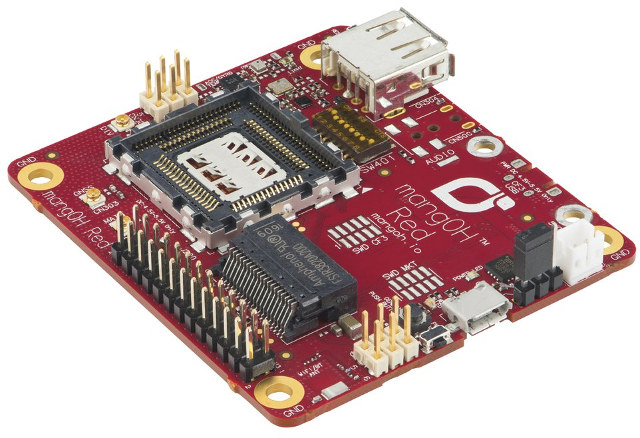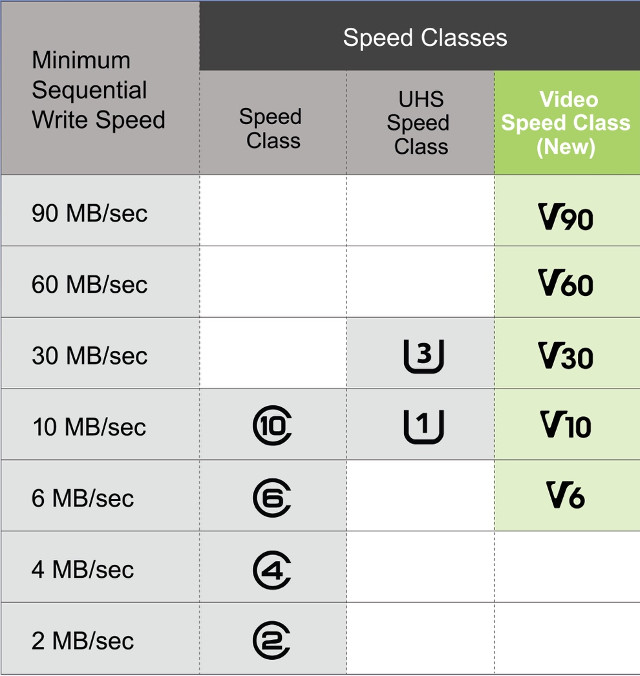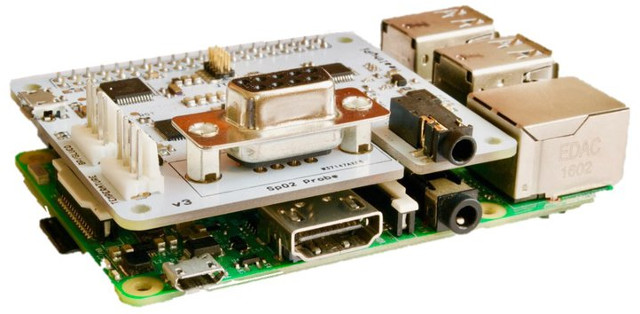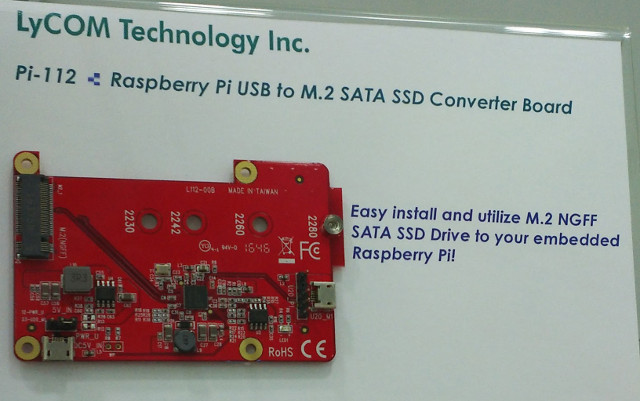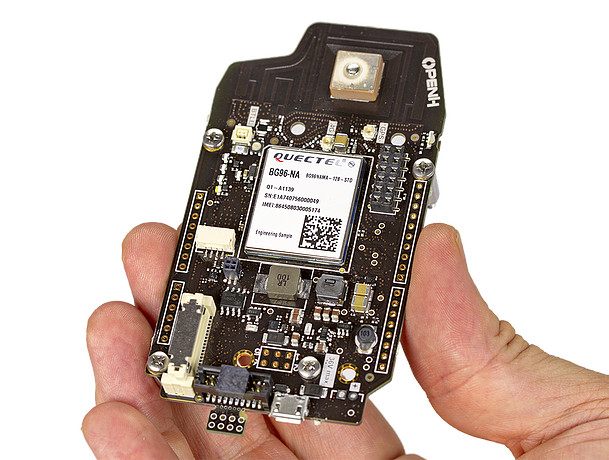Sierra Wireless has announced MangOH Red open source hardware platform designed for IIoT (Industrial IoT) applications with a snap-in socket for 2G to 4G & LTE-M/NB-IoT modules, built-in WiFi and Bluetooth, various sensors, a 26-pin expansion header, and more. MangOH Red board specifications: Snap-in socket to add any CF3-compatible modules, most of which based on Qualcomm MDM9215 ARM Cortex A5 processor including: Airprime WP7502 LTE Cat 3, HSPA, WCDMA, EDGE/GPRS module Airprime WP7504 LTE Cat 3, HSPA, WCDMA, CDMA module Airprime WP7601 LTE Cat 4 module Airprime WP7603 LTE Cat 4, WCDMA module Airprime WP8548 HSPA, WCDMA, EDGE/GPRS, and GNSS module AirPrime HL6528RD quad-band GSM/GPRS Embedded Wireless Module designed for the automotive market And more…. Storage – micro SD slot Wireless MCU Module – Wi-Fi 802.11 b/g/n and Bluetooth 4.2 BLE module with an ARM Cortex-M4 core MCU (Mediatek MT7697) providing access to real-time I/Os Wireless Connectivity “Accessories” Micro SIM card […]
Micro SD Cards for Development Boards – Classes, Tools, Benchmarks, Reliability, and Tips & Tricks
When people plan to use a development board for their project, they mainly focus on the requirements of the development board itself, as well as software support. But selecting the right accessories may be just as crucial for good performance and stability. For example, selecting a proper power supply is important, as the board may freeze or randmly rebooted if it is not feed at the right voltage. Part of this is selecting a micro USB cable, as you’ll want a cable with minimal resistance which can be achieved through shorter cables and/or a low AWG value. Another important item that can impact stability and performance of the systems are micro SD cards when used to run the operating system in development boards. Understanding SD Card Performance Metrics & Classes Until a few years ago, (Micro) SD cards were primary used to store data such as photos, videos and music. […]
HealthyPi Raspberry Pi HAT Measures ECG, Body Temperature, and Oxygen Saturation (Crowdfunding)
Bangalore based ProtonCentral has launched the third version of Healthy Pi, a vital sign monitor using the Raspberry Pi as its computing and display platform, and capable of measuring body temperature, oxygen saturation, and ECG/respiratory data. Healthy Piv3 board specifications: MCU – Atmel ATSAMD21 ARM Cortex M0 MCU, compatible with Arduino Zero Vital Signs Chips ECG and respiration front-end – TI ADS1292R 24-bit analog front-end with SNR of 107 dB Pulse oximetry – TI AFE4490 Pulse Oximetry front-end with integrated LED driver and 22-bit ADC Temperature – Maxim MAX30205 digital body temperature sensor for skin temperature sensing Expansions Headers and Ports 1x 40-pin header to connect to Raspberry Pi 2x 3-pin connectors for temperature and BP/GLUCO DB9 connector for finger-clip Spo2 probe 3.5mm jack for ECG cable and probes 1x UART connector for an external blood pressure module USB – 1x micro USB port for power and programming Debugging – […]
Apple Opens HomeKit Accessory Protocol Specification to Non-Commercial Projects
HomeKit is a software framework that allows Apple users to control smart devices with their iPhone or iPad. But so far, you had to become an MFI licensee to design a HomeKit compatible device, you product had to be tested by Apple, and – according to a story on Hackster.io – also required a special cryptographic chip for authentication. Developers creating commercial devices still need to become an MFI license, but Apple has now opened HomeKit Accessory Protocol Specification for non-commercial projects, meaning you can now use the Framework on Arduino, ESP8266 boards, Raspberry Pi, and other development boards using software authentication. You could already use HomeKit on Raspberry Pi board previously using HomeBridge, but the advantage now is that you don’t need to breach Apple’s terms and conditions, and you can talk directly to your phone without the need for a bridge. If you want the specifications got to […]
Amazon AWS Greengrass Brings Local Compute, Messaging, Data Caching & Sync to ARM & x86 Devices
Amazon Web Services (AWS) provides cloud computing services to manage & store data from IoT Nodes over the Internet, but in some cases latency may be an issue, and Internet connectivity may not be reliable in all locations. AWS Greengrass provides a solution to those issues by running some of the IoT tasks within the local network in ARM or x86 edge gateways running Linux. You can still manage your devices from AWS cloud, but a Linux gateway running Greengrass Core runtime will be able to run AWS Lambda functions to perform tasks locally, keep device data in sync, and communicate with devices running AWS IoT Device SDK. Greengrass benefits include: Response to Local Events in Near Real-time Offline operation – Connected devices can operate with intermittent connectivity to the cloud, and synchronizes with AWS IoT once it is restored Secure Communication – AWS Greengrass authenticates and encrypts device data […]
LyCOM shows off a range of Raspberry Pi Hats at Computex 2017
Taiwanese LyCOM, a maker of various I/O accessories showed off a range of Raspberry Pi compatible expansion boards at Computex. Some of them are rather unusual, such as the Pi-112 which adds M.2 drive support. LyCOM also offers modules that adds SATA and mSATA support. Common among all three modules is that they use a USB to SATA bridge chip, although unfortunately I wasn’t able to determine who the manufacturer of the bridge chip was, as all the hats were in a glass display case. All three hats have a micro USB connector that needs to be connected to one of the USB ports on the Raspberry Pi board, but they can also be connected via a pin-header. The M.2 adapter also has a second micro USB port for power and it’s of course only compatible with SATA based M.2 drives. LyCOM was also showing off a full-size SD card […]
XOD is a Visual Programming Language for Arduino, Raspberry Pi, and other Maker Boards
When you think about visual programming on the Raspberry Pi or Arduino board, Scratch may come to mind, but some developers have decided to create their own visual programming language working for Arduino, Raspberry Pi, and other boards. Meet XOD, pronounced ksəud. The developers explains their used “functional reactive programming principles and added graphical functionality”. XOD is comprised of “nodes” that represents either some physical device like a sensor, motor, or relay, or some operation such as addition, comparison, or text concatenation, which you can link together through inputs and outputs to create a program, and XOD IDE will compile the resulting diagram to create and upload a binary program to Arduino, Raspberry Pi, etc… You can also convert a XOD diagram into a node with inputs and outputs to use it in another diagram, so the language is scalable. The developers are now looking for testers to play with […]
OpenH PULSAR and QUASAR Boards Add 4G LTE Cat M1, or Cat 4/1 to Raspberry Pi Boards
We’ve seen a bunch of IoT boards with 2G connectivity recently including Orange Pi 2G-IoT, Wio GPS, and Nadhat, but while in some countries 2G will still work for many years, those boards are already obsolete – or soon will be – in many other countries. However, finding low cost 3G / 4G boards is more difficult, and while one solution is to use 3G or 4G USB dongles, “OpenH – Open Hardware” – part of KLiP Industries – has designed two boards with 4G connectivity provided by Quectel modules. OpenH PULSAR Board PULSAR board is compatible with Arduino Zero and features the following specifications: MCU – Atmel/Microchip SAMD21 ARM Cortex M0+ MCU (the as the one used in Arduino Zero) Connectivity 4G LTE Cat M1 modem with GPS (Quectel BG96-NA); No external antennas required Bluetooth and NFC Security – Dedicated management CPU with crypto engine Power Supply 10W digital power supply and battery charger with direct solar input FCC […]


